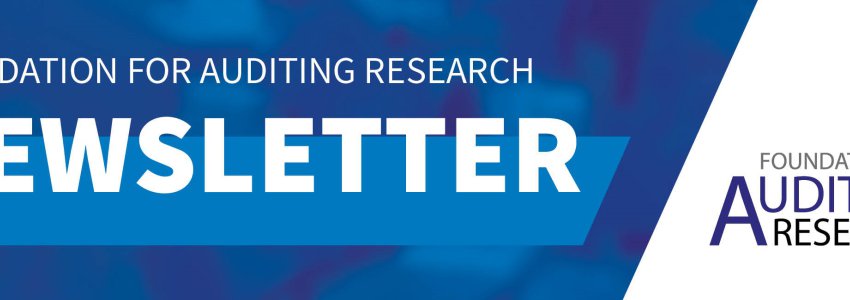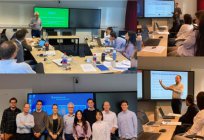Newsletter October/November 2022
7 November 2022

Want to be the first to know? Then don't forget to follow our LinkedIn page. Did you know that FAR also has a YouTube channel? Here you can find all of the FARview Podcasts.
In this newsletter:
- Recent publications
- Seven years FAR: from sowing to harvesting
- FAR seminar and inaugural address Jere Francis in Maastricht
- Visual recordings of the presentations on 15 September
- FAR Joint Working Group on Audit Innovation
- FARview #22 with Frank Moers on "Tacit knowledge, audit quality, and talent identification.
- FARview #23 with Sander Tiggelaar on 'Management control in auditing firms and its implications for managing coxisting objectives'
- FARview #24 with Xiaoxing Li on 'Audit technologies and auditor judgment'
- FAR PhD seminar with Jere Francis
- Presentation Jan Bouwens at red-carpet-debate
- FAR Brown Bag Seminar on 18 November 2022
- Upcoming events – save the dates!
Recent publications
The first concerns a MAB publication (in Dutch) entitled 'Let op: deze controleverklaring valt buiten AFM-toezicht' by Tjibbe Bosman, Merel van der Kuip and Wim Janssen. According to the AFM-Monitor, around 19,333 statutory audit reports were issued in the Netherlands in 2019, but which organizations receive these audit reports for which accounts and whether this data is publicly available has so far not been structurally mapped out. At the same time, there is an increasing need for information on audit quality for the market as a whole. For financial statement users, policymakers and other stakeholders, it is not always clear which audits fall under the Audit Firms Supervision Act (Wta) and thus under AFM supervision. In this descriptive article, we estimate the numbers of Wta audits and whether they are publicly available. Of the statutory audits, 18,311 statements (95%) are publicly available through various sources, such as the Chamber of Commerce.
The second publication is a FAR Literature Review 'A systematic literature review on companies' auditor selection process', by Jonas Vandennieuwenhuysen, Kris Hardies, Marie-Laure Vandenhaute and Kris Hoang. They provide a systematic review of the academic literature on the auditor selection process, that is, the process through which companies select and hire their auditor. This process encompasses decisions about the actors involved in that selection (e.g., the audit committee, the CFO), its timing (initiation, duration), the procedures and decision-making processes (e.g.,
formal tendering, assessment criteria, documentation, evaluation), and the eventual
appointment of the auditor (e.g., shareholder voting on auditor ratification). Hence, this review increases our understanding of how companies select an external auditor, as distinct from their initial decision to hire an auditor ─ and which auditor to hire specifically ─ or to switch auditors.
Next, we have a FAR Working Paper on 'Well-calibrated professional skepticism: its benefits on auditor responsiveness to the risk of material misstatements and its roots in culture controls and auditor values' by Jasmijn Bol, Isabella Grabner, Katlijn Haesebrouck and Mark Peecher. This paper has recently been submitted to the 2023 Management Accounting and the Auditing Section Midyear Meetings.
Using a multi-method approach, we first introduce the construct of well-calibrated
professional skepticism and identify how it facilitates auditors’ response to heightened risk of material misstatement without also raising costly false alarms. We then draw on the management and management accounting literatures to identify several audit firm “soft” culture controls and auditor-specific characteristics that we predict, and find evidence consistent with being, antecedents of well-calibrated professional skepticism. We position well-calibrated professional skepticism as an internalized value and connect it to the psychology literature on calibration. We
discuss how audit firms can improve the portion of their audit professionals who are well-calibrated professional skeptics by improved selection during recruitment of human talent and by investment in culture controls that credibly reveal a commitment to “walking the talk” when it comes to audit quality.
Lastly, we have a Literature Review on 'Involvement in the development of data analytics and auditors' application of professional skepticism', by Anna Gold, Joseph Brazel, Justin Leiby and Xiaoxing Li.
Audit firms around the globe have invested heavily in a variety of audit technologies. Of these technological developments, audit data analytics (ADA) are receiving increased attention because they enable auditors to incorporate more diverse data and visualizations into their testing (i.e., graphical representations such as charts, scatter diagrams, trend lines, or maps). The American Institute of Certified Public Accountants (AICPA) defines ADA as “the science and art of discovering and analyzing patterns, identifying anomalies, and extracting other useful information in data underlying or related to the subject matter of an audit through analysis, modeling, and visualization for the purpose of planning or performing the audit” (AICPA 2015, p.92; 2017, p.1). The current study focuses on ADA visualizations, which can aid auditors when scrutinizing audit evidence and ultimately improve audit quality.
Seven years FAR: from sowing to harvesting
In October 2015, the Foundation for Auditing Research was established, now widely known as "the FAR. An autonomous research institute, informing the public debate on audit quality through scientific research. After seven years of sowing, harvest time has now arrived. A good time to look back, to interpret the status quo and, above all, to look ahead, with FAR directors Henriëtte Prast, Olof Bik and Jan Bouwens.
Read the full article on Accountant.nl below.
FAR seminar and inaugural address Jere Francis in Maastricht

It is instilled in many economists to analyze phenomena at a high level and not at an individual level. For a long time, that was also the approach of Prof. dr. Jere Francis, who delivered his inaugural address at Maastricht University on Sept. 15, 2022. But he has since reversed that position. Francis is now fully convinced that individual partners and teams within auditing firms in particular determine the quality of auditing.
Francis' inauguration was preceded by a FAR symposium themed "Audit Culture and Beyond," held at the Bonnefantenmuseum in Maastricht. Speakers included Lena Pieper (PhD candidate at Maastricht University), Steven Maijoor (board member of De Nederlandsche Bank) and Eddy Cardinaels (professor of Accounting at Tilburg University and KU Leuven).
For the full article on the FAR symposium and the inaugural address, see the article in Accountant.nl
Find the full inaugural address here.
Visual recordings of the presentations on 15 September
Click here for: Welcome (Jan Bouwens)
Click here for: Partner-Manager dyadic fit and audit team functioning (Lena Pieper)
Click here for: The relevance of Jere's work (Steven Maijoor)
Click here for: New insights on audit quality: a social dynamics perspective (Eddy Cardinaels)
Click here for: Closing reflections (Jan Bouwens)
FAR Joint Working Group Audit Innovation
FAR has established a Joint Working Group to focus on the issue of how innovations in auditing affect the way audits are conducted (e.g., more data-driven, eliminate sampling), the subject matter of auditing (ESG, machine learning/AI. After one preparatory group developed a paper over the past year, the first meeting of the full Joint Working Group, which included auditors from practice and academics, took place on Sept. 16, with the task of determining the exact topics and defining the questions that this project should answer.
FARview #22 with Frank Moers on 'Tacit knowledge, audit quality and talent identification'

In this FARview podcast, Frank Moers (Professor of Management Accounting & Control, Maastricht University) discusses the paper 'Tacit Knowledge, Audit Quality, and Talent Identification'. This paper is a product of the FAR project 'The Loss of Talent' that Moers is conducting together with Isabella Grabner and Judith Künneke. According to them, too little attention is paid to the value of -and appreciation for- 'tacit knowledge' during the career path of accountants within the firm. This could well be one of the reasons why talented accountants leave an accountancy firm. That's a shame, because tacit knowledge is positively related to audit quality.
FARview #23 with Sander Tiggelaar on 'Management control in auditing firms and its implications for managing competing objectives'

In this FARview podcast, Sander Tiggelaar is our guest. Sander is a PhD candidate at the University of Groningen. In the podcast, Sander discusses his PhD project "Management control in auditing firms and its implications for managing coexisting objectives," for which a literature review is already available on the FAR website. Meanwhile, the first round of interviews for the study has been completed. Auditing firms use multiple control mechanisms simultaneously. These include both outcome-based (such as revenue) and value-based (such as culture) mechanisms. Sander investigates to what extent these different control systems are related to the behavior of accountants, and especially how these systems can cooperate with each other in steering (desired) behavior.
FARview #24 with Xiaoxing Li on 'Audit technologies and auditor judgment'

In episode 24 of FARview, PhD student Xiaoxing Li (Vrije Universiteit Amsterdam) talks about her FAR PhD-project, which concentrates around data analytics. Auditors' data analytics potentially has many benefits for auditing but may also challenge the application of professional skepticsm.
The main focus of the podcast is on a recent article by Xiaoxing in Maandblad voor Accountancy en Bedrijfseconomie (MAB): Behavioral challenges to professional skepticism in auditors’ data analytics journey. Next to defining auditors’ data analytics and explaining its importance, Xiaoxing discusses potential behavioral challenges to professional skepticism from five perspectives that she derived from the data analytics literature.
FAR PhD Seminar with Jere Francis

On Friday, Sept. 23, FAR organized a research PhD seminar with Jere Francis, Jonas Vandennieuwenhuysen, Lena Pieper, Christian Peters, Tjibbe Bosman, Xiaoxing Li, Cara Zhang, Sander Tiggelaar, Iver Wiertz and Paul Masereel. It was another inspiring day at Maastricht University.
Ideas and feedback were exchanged, including opportunities and challenges in working with unique proprietary data in line with Jere's inaugural lecture on "going small" in audit research.
Topics included full population testing vs. sample testing, the importance of collaboration with auditees for audit quality, client-auditor alignment, workload management and information sharing in audit teams.
Thank you to all participants for this great morning!
Presentation Jan Bouwens at red-carpet-debate
On October 14th, Jan Bouwens presented at the red-carpet debate at the International Theater Amsterdam. He defended the proposition that we can learn much more from small differences between the opinions of different auditors evaluating the same audit file than from very large mistakes such as those made at Imtech or Carillion. These major accidents happen infrequently, and the mistakes are so obvious that everyone agrees that the audit led to a wrong judgment. Deviations in judgments between auditors based on the same audit file are much more telling. After all, they are much more common, and their discussion may lead to more data collection or an adjustment in the file. All the small learning points from such an analysis together provide much more insight into where, when and why judgment errors occur than the very large errors do. Jan published this idea on De Accountant.
FAR Brown Bag Seminar 18 November 2022
On Friday, 18 November 2022, from 3:30 - 4:30 p.m., FAR will organize another Brown Bag seminar for Young Academics and Young profs. This time Christian Peters (Tilburg University) will present. The presentation will be followed by a discussion. Afterwards the participants can ask questions. More details to follow soon.
Are you part of the target group and would you like to participate? Please send an email to info@foundationforauditingresearch.org
Upcoming events – save the dates!

FAR Conference 2023
We would like to let you know that we have set the date of our 2023 Annual Conference for Monday, June 19 and Tuesday, June 20. We are currently busy determining the program, but please mark these dates in your calendars for next year!
FAR Young Auditing Academic Brown Bag Seminars
On Friday, November 18, 2022, FAR will host its next online Brown Bag Seminar for Young Academics and Young Profs, again from 3:30 to 4:30 pm.
See the earlier post about it in this newsletter.
Are you part of the target group and would also like to participate? Then send an email to info@foundationforauditingresearch.org
Do you have suggestions on how to improve our newsletter or news you would like to share with us? Please let us know by sending an email to
info@foundationforauditingresearch.org
Back to overview
